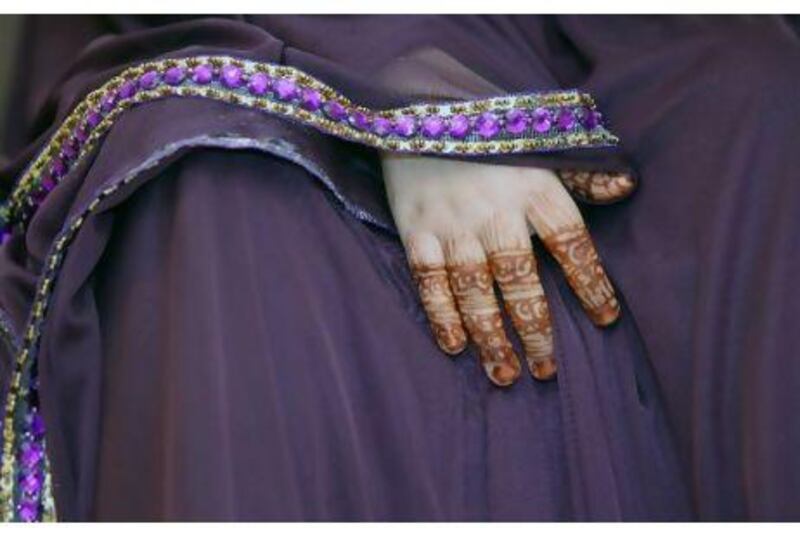The Khozam neighbourhood is coloured by dozens of old villas converted into brightly painted beauty parlours in pink, gold and orange. The salons are as resplendent inside as out and mums, daughters, sisters, nieces and aunties come here to prepare for nightly wedding ceremonies that take place across Ras al Khaimah.
Of course, what happens inside their high walls is a secret. Women leave the gates with their faces covered and veils placed gently over their newly styled locks. They set off for marriage halls filled with hundreds of others who have undergone similar regimes to achieve a look of effortless beauty.
The wedding season runs seven nights a week, with only a short reprieve for Ramadan. And the bridal glow at the salons does not come from love, but a brutal beauty regime that is not so much a thing of elegance as endurance.
Just ask the women at the Butterfly Beauty Centre, where brides-to-be undergo a scented Moroccan bath before their skin is scrubbed, plastered and peeled, their eyebrows threaded and their hair curled, teased and straightened. They chatter and exchange stories while being pummelled and pumiced. "The business is not just about being beautiful, it is about the relationship with the women," says Shamma Noor, 32, a make-up and henna artist from India who works at the Butterfly. "If the customer is relaxed with us, they will continue [to return] every time."
The tradition extends down through generations. Women who were once brides bring their daughters to prepare for the weddings of their sisters and cousins. The youngsters get similar attention to the grown-ups, with lavish styles that befit the lavish nature of these cultural events.
While some may misconstrue the extravagant preparations as a symptom of new-found wealth, they date to the days when women would perfume their hair with saffron and blacken their eyes with kohl.
Like any salon worth its name, the Butterfly is not without drama. One customer returned three times in tears because her eyebrows were not long enough to be styled like those of the Lebanese singer Amal Hijazi. On another occasion a bride and her mother came to blows over who would wear a tiara at her wedding.
Although one bride at the shop on this day will have her make-up done at home after lengthy preparation for her nuptials, her relatives fill the salon's two floors, if somewhat reluctantly. Alya al Mesafri, 34, came to the Butterfly to prepare for her sister's wedding. She has never liked such ceremonies, not even her own.
"For two weeks I didn't eat, I didn't see my father," she says. She lost nearly 8kg because of bridal anxiety.
The treatments can also run towards the colourful. Shamma, the bride's cousin, wore purple plaid trousers and a matching shirt while her curls were set.
Ready for her make-up, she changed into an electric green dress with black lace and heavy beads that looked like it may have come from the set of the black comedy Beetlejuice. Ms Noor, an accomplished make-up artist, completes Shamma's striking look with lime-green and canary-yellow eyeshadow. However, she feels her ability pales before beauticians from Lebanon, whose wizardry is renowned throughout the region.
"If they are applying make-up, somehow it's different," Ms Noor says. "It's like a magic act."
Few are better at that magic than Roula Hajjar, 37, the Lebanese woman who owns the Butterfly. Celebrities who have known her deft touch include the singers Najwa Karam, Dina Hayek, Rola Saad and Sabah, all compatriates of hers.
Still, Ms Noor is no slouch. Customers come to the salon and have her do their make-up when Ms Hajjar is on holiday, thinking that she is her well-known boss. Only afterwards, when they thank her for her expertise, do they realise their mistake.
The salon's stylists come from Algeria, India, Lebanon, Morocco, Palestine, the Philippines, Tunisia, Uzbekistan and Yemen. They speak a pidgin of English, or Levant and Gulf Arabic. The customers trust their hair to Svetlana Shamshatova, a Russian civil engineering graduate from Uzbekistan who started dressing tresses after her daughter was born.
"As a hairdresser one day you can be at home and one day you can be with the family," she says. "I'm not going for this job for money. It's about art. I'm looking to create something. The hairdresser can also connect with people."






